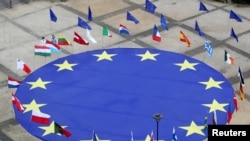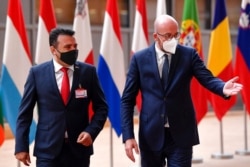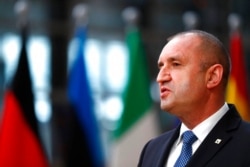North Macedonia's bid for membership in the European Union was held up for two decades by a dispute with Greece over its name. One painful compromise later, the road forward is being blocked again — this time by Bulgaria in a dispute over language and historical grievances.
And Albania, whose EU bid is to be considered in tandem with that of North Macedonia, is collateral damage.
Both North Macedonia and Albania had high hopes of moving forward this year, but progress was brought to a halt at a June meeting of the EU's General Affairs Council, where Bulgaria exercised its veto as an EU member to block the start of accession negotiations with North Macedonia.
Among several cultural and historic grievances, Sofia called for North Macedonia to acknowledge that the language spoken there is derived from Bulgarian. That is a bitter pill for the government in Skopje, which already acceded to the addition of "North" to the country's name to satisfy the objections of Greece, which has a province named Macedonia.
The government in Skopje said it does not plan on giving up on its EU aspirations and that it will continue to actively seek out a solution.
"If there is political will and leadership on the side of Bulgaria, I think we can find a European solution that would be good for Macedonian-Bulgarian friendship, for the European promise to the region, and for North Macedonia. But there is an 'if,' because we already did our best," Nikola Dimitrov, North Macedonia's vice prime minister for European affairs, said in comments reported by Euronews.
In a June 28 statement on its Foreign Ministry website, Bulgaria maintains it is committed to resolving its differences with North Macedonia, but it demands an end to what it describes as the suppression of the rights of people in North Macedonia "who identify themselves as Bulgarians."
Experts in the United States — which supports EU integration of the entire Balkans — warn that the delay in starting accession talks with the two countries is likely to be exploited by Russia and China to increase their influence in the western Balkans.
Balkans expert Edward Joseph, a senior fellow with the Johns Hopkins University School of Advanced International Studies, describes the impasse as an extremely serious challenge for the EU and its vision.
"This is an unconscionable blockage and imposition by Bulgaria against North Macedonia. Failure to do this will destabilize the Balkans and represents an opening for Russia and China in the region," Joseph told VOA's Macedonian Service.
Аll other countries in the EU agree that North Macedonia and its 2 million people are more than ready to join the bloc.
"North Macedonia has done what it has been asked; it has done more than any other country has been asked. And we in the United States, we respect what North Macedonia has done in this compromise, which was a true compromise with Greece," Joseph said.
He argued that Bulgaria is demanding that Macedonians "accept a version of history, a version of who they are — except that version that Bulgarians insist upon is against EU values," which maintain that members must not bring bilateral issues into the accession process.
Bulgaria, for its part, maintains that it sees EU enlargement in the western Balkans as a priority and that it does not object to accession talks with Albania, although at present the bloc is not prepared to discuss the one country without the other.
"We are resolute to continue the dialogue with the Republic of North Macedonia," the statement on its Foreign Ministry website says. "We are committed to finding pragmatic, sustainable and mutually acceptable solutions to the challenges inherited from the past."
Joseph argues that if the EU members are not able to bring sufficient pressure on Bulgaria and North Macedonia to move the process forward, the United States should step in.
"Washington has to join with Brussels and with key capitals Berlin, Paris and others, and bring requisite pressure," he said, noting that U.S. President Joe Biden had himself argued in the 1990s for the Clinton administration to do more to integrate the Balkans with western Europe.
Erwan Fouéré, a former EU special representative in North Macedonia, offered a similar assessment.
"The Americans are expecting the EU to take assumed leadership. And unfortunately, the EU is not assuming the leadership as it should," he said. "The situation with Bulgaria and the veto that Bulgaria imposed … undermines the entire EU enlargement agenda. So many promises that have been given to North Macedonia, that have been broken, and this is another one now," he told VOA Macedonian.
Fouéré, currently a senior associate research fellow at the Center for European Policy Studies in Brussels, said the way forward may require "mediation by a third party, by the Council of Europe or OSCЕ. These are all entities that have experience in resolution of bilateral disputes."






